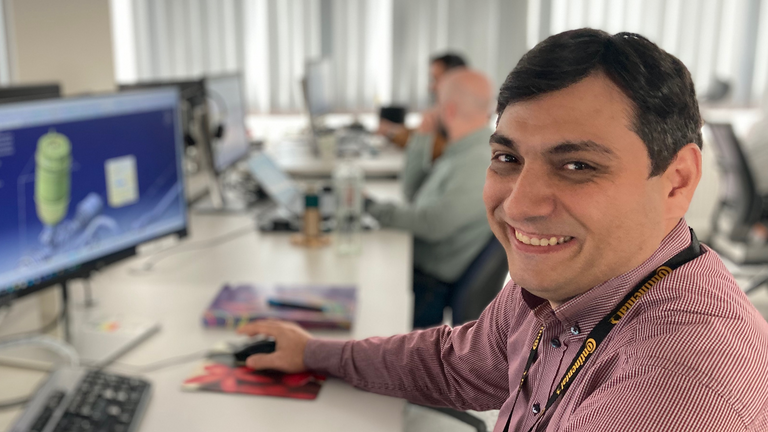Software Engineering and System Engineering: shaping tomorrow’s mobility today
Software engineering, software development and its smart implementation is becoming increasingly important and the main driver for innovations. With us you have the opportunity to play a vital role in technological novelties and trends that will shape the future of driving.
And ultimately, changing everyone’s lives to the better.
From highly secure driver assistance systems, artificial intelligence processes, cutting-edge sensor technology, to autonomous machine learning – at Continental your software will always benefit millions of people. Revolutionize the future of mobility.
Create your own success story
We believe that everyone has the potential to change the world. Because that’s exactly what our employees do every day. So we provide them with everything they need to make their specific work exciting, impactful and most of all true to their values and lifestyles.
You’ll be surprised what you can do at Continental – time to find out:
Meet Jessica: making tires smarter for a sustainable future
From her beginnings as a working student to becoming a development engineer, Jessica's six-year journey at Continental is nothing short of inspiring! By developing tire sensors that monitor various metrics, her work contributes to lower emissions and longer tire life. What does Jessica particularly appreciate about Continental? The international teams and the diversity of cultures. She enjoys the flexibility to organize her day and the trust her team leader places in her.
Raluca’s career journey: driven by passion, empowered by opportunities
“Whenever you want a change in your career or you may feel stuck on your path, you can always talk to your leader and together you can find a solution.” Raluca has been a Software Developer and Software Engineer at Continental for 8 years. Since then, she has taken over different roles in coordinating Software Teams and is now working as Release Train Engineer. What Raluca’s loves most about Continental? Watch her story and find out.
My job is done when clean air becomes a matter of course
Franziska Niebergall studied electrical engineering and, after completing her diploma thesis, joined Continental as a software engineer in the field of security: “My job makes me feel good! I contribute to the development of safe, environmentally friendly electric drive systems – and that’s why I go home feeling good every day. My work never gets boring! Every new task brings a new and interesting problem to the fore and we have to find a solution to it together as a team. Everyone brings their talents to bear and thus contributes to the overall result! We help each other, learn from each other, and find a good solution together. And, of course, we are delighted to see the result of our joint work in the vehicle.”
My job is done when our vision is visible on every road
Holding a doctorate in physics, Senior Systems Engineer Oliver Fochler specializes in theoretical high-energy nuclear physics and numerical simulation. “It’s my job to bring automated driving to the road. Following five years of development work, I can’t wait to finally experience it in everyday traffic on the freeway. There will be a product on the market that will help prevent thousands of road accidents around the world. Continental strives for innovation and makes a major contribution to the transformation of mobility.
Discover a job opportunity that fits you
Continental offers you a whole world of possibilities in Software Engineering and System Engineering. Find the right job that matches your career goals, strengths and interests.
A typical work day of a Software Engineer
The following daily schedule is just an example to illustrate what a typical day might look like. Naturally, the actual schedule may vary depending on individual preferences and circumstances.
I start my day with a brief team sync. We gather to discuss what’s on the agenda, going over the current sprint goals and any blockers that might be in our way. I check Jira to review my tasks for the day and ensure I’m aligned with the team on what needs to be prioritized. It’s a quick, focused discussion that helps set the tone for the rest of the day.
With the priorities set, I dive into my main development tasks. If I’m working on a feature, I’ll spend this time implementing code, whether it’s writing a new algorithm for sensor fusion or building out infrastructure on AWS using Terraform. If it’s a debugging day, I’ll dig into logs and system behavior, looking for the root cause of an issue. I really enjoy these uninterrupted blocks of time where I can focus on coding and problem-solving. It’s satisfying to see things take shape or find solutions to tough challenges.
After a solid two hours of work, I take a quick break to reset. Whether it’s grabbing a coffee or just stepping away from the desk, it gives me a chance to recharge before the next session.
Back at it, I shift gears to system integration. This is where the pieces come together, and I get to collaborate with others on the team. We integrate the different software modules and test how they interact. If issues come up, I help with debugging, which often involves working with both the software and hardware teams. This part can get intense because any small issue can ripple through the system, but I enjoy the challenge of making everything work together seamlessly.
By now, I’m ready for lunch. I usually take 30 minutes to eat, relax a bit, and maybe catch up on some reading or chat with colleagues.
After lunch, I spend time reviewing code. Whether I’m reviewing my own code or going through a colleague’s work, it’s important to maintain high standards. I leave constructive feedback and make sure everything aligns with best practices. Once the reviews are done, I switch to documentation. I update internal docs to make sure everything is clear for future reference, whether it’s system architecture, user instructions, or admin documentation. Keeping documentation up-to-date is key to preventing confusion later on.
Next, I shift my focus to troubleshooting. This could mean working through integration issues, debugging new code, or resolving production problems that have surfaced. I like the investigative aspect of debugging — tracking down the source of a problem and figuring out how to fix it. It’s a mix of technical know-how and creativity.
As the day winds down, I wrap up any remaining tasks. I update Jira with my progress, noting what I completed and flagging anything that might need more attention tomorrow. Before I log off, I review what’s coming up next, so I’m prepared to hit the ground running in the morning.
With the day’s work done, I clock out. It’s always a good feeling to reflect on what I’ve accomplished, knowing that everything is progressing on track.






